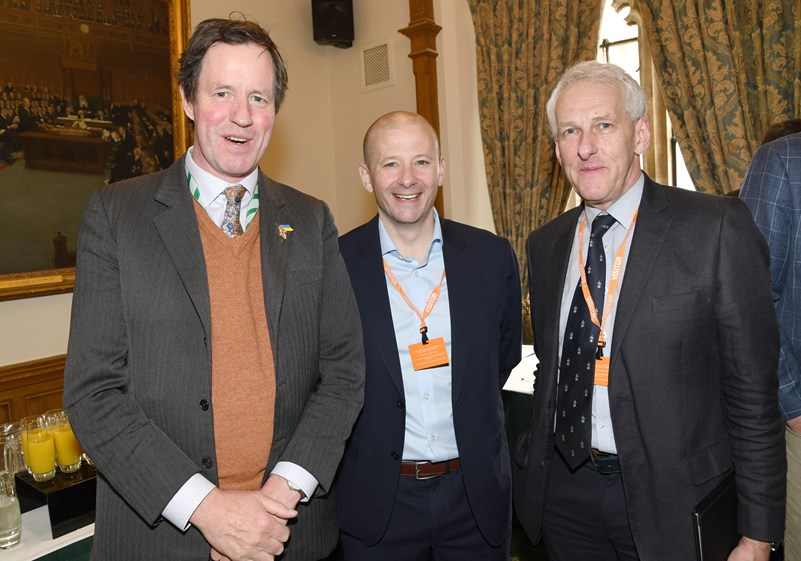Young foresters and farmers more open to cooperation
Younger foresters and farmers are more open-minded than older generations about working together and trying out new ideas, one of Scottish Woodlands’ Forest Managers told a Westminster meeting.
Jillian Kennedy was speaking at the All-Party Parliamentary Group (APPG) on Forestry and Timber Security - as part of a panel discussion on Farmers and foresters working together - what does that look like?
The event, held in the Houses of Parliament, was scheduled during the week of International Day of Forests 2025, which had the theme of Forestry and Food.
Several speakers said foresters and farmers must cooperate more closely, and communicate more effectively, to ensure better decisions are made on future land use.
Jillian described her background growing up on a cattle and sheep farm in Perthshire, run by her dad Martin, the most recent past President of the National Farmers Union of Scotland.
“I understood farming and gamekeeping, and the holiday cottages, but the forestry side not so much,” she said. “I landed in forestry accidentally - and now I’ve found there is a forestry community in the same way there is a farming community but the two do not always talk very well together."
“It’s fantastic to live in and work in the rural sector and we should all be working together to drive it forward.”
Jillian, who is active in the Scottish Association of Young Farmers’ Clubs, was asked if she thought younger generations were less entrenched and more open to collaboration. “Yes, I do,” she said. “The world is much more open and the younger generation is looking at more different ways of doing things, looking for alternatives and are more open to change.”
She said older foresters and farmers had a tendency to say ‘It’s aye been” (It’s always been this way) and were often more reluctant to embrace change.
Jillian thought challenges faced by farmers and foresters were often very similar - such as carrying out carbon audits - and that there was lots of common ground. “We need to get more young farmers into these kinds of conversations,” she said.
The panel also heard from David Edwards, Deputy CEO of the Food and Farming Commission, Hywel Lloyd from Labour Coast and Country - and Anthony Geddes, Head of Investment at Euroforest Silviculture.
Mr Edwards thought the forestry industry should be playing a more significant role in the UK Government’s land use consultation, which opened in January. He said: “Forestry is massively under-represented and maybe that’s on us (farming interests) as well as the forestry side.”
Mr Edwards suggested that the APPG on Forestry should organise a joint event with the APPG on Farming to discuss more effective working relationships in detail.

Panel: David Edwards, Food & Farming Commission; Hywel Lloyd, Labour Coast and Country; Jillian Kennedy, Scottish Woodlands Ltd; Anthony Geddes, Euroforest Silviculture
Hywel Lloyd, of Labour Coast and Country, who worked for two ministers in low-carbon and rural affairs roles in previous Labour governments, said there was still a stereotypical view of commercial forestry as heavily industrial without clear local roots. “This is a big challenge and there’s a need to build better relationships,” he said, with forestry and timber businesses being more visible in their local communities.
He urged the forestry industry to focus on a “pull” approach - explaining the positive economic and environmental benefits it had to offer and pulling in groups who hadn’t traditionally understood or engaged. “Show how forestry can benefit them - so the conversation continues when you leave the room,” he said.
Anthony Geddes said "historical barriers at regulatory level” had made it difficult for farmers and foresters to create successful, large-scale commercial woodland creation schemes. He called for clearer communication by foresters, and this often meant subscribing to farming publications and just talking to farmers. “It’s not that hard,” he said.
Richard Stanford, Chief Executive of the Forestry Commission, described how trees can deliver Government policies and help keep people on the land. He urged the forestry industry to talk less to itself, and engage more with different sectors, including the farming community.
He showed the ‘purple map’ produced by the Forestry Commission of 2.8 million hectares of land in England where woodland creation could happen in a non-contentious way - avoiding Grade 1-3 agricultural land, National Parks and sites of historical or scientific interest.
“If you follow the application process in those areas, we will aim to process your application in 12 weeks,” he said.
Stuart Goodall, Chief Executive of Confor, said farmers faced a number of significant challenges, such as pressure to reduce greenhouse gas emissions, uncertainty over future subsidies, falling meat consumption and questions over trade agreements and exports.
Against that backdrop, forestry was a real opportunity which could provide a strong long-term income stream, a chance for ‘carbon insetting’, shelter belts for animals (improving health and resilience) and much more.
Scottish Woodlands Ltd was one of the sponsors of the APPG event, and its Director of Investment and Business Development David Robertson also attended the meeting.
